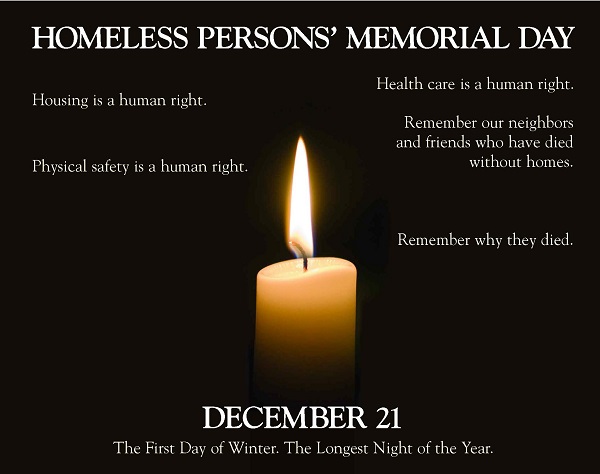Human Rights Commission to honor Homeless Persons’ Memorial Day Dec. 21
4 min read
On Wednesday, Dec. 21—the longest night of the year—the Eugene Human Rights Commission will join in commemorating the annual Homeless Persons’ Memorial Day.
The event, sponsored by the HRC’s Homelessness and Poverty Work Group, will start at 5 p.m. in the downtown Eugene Park Blocks at 8th and Oak.
Homelessness began as a nationwide epidemic in the 1980’s. Since, an entire generation has been raised in a world where it is normal to see human being sleeping on the street. All too often, those who die on the streets are not connected to family or support systems who can hold a funeral or properly honor them.
Because of this injustice, the National Coalition for the Homeless and the National Health Care for the Homeless Council commemorate December 21—the longest night of the year—as the first Homeless Persons’ Memorial Day in 1990 to remember those who died during the year without housing.
32 years later, the epidemic has grown, with more people living and dying without housing. Let us remember all those who lost their lives for lack of housing, reflect on the shocking inhumanity of homelessness, and call for meaningful policy changes to ensure that no life is lived or lost in homelessness. Below are ways to engage in advocacy to get to the root causes in ending homeless mortality.
For 2022, advocates for the homeless shared the following advocacy agenda:
Educate!
- Coordinate discussions with local policymakers, public health authorities, and Medical Examiner/Coroners’ Offices about the need to better understand the causes of homeless death. There is limited data on the causes of homeless mortality. Education is needed to increase awareness about homeless mortality and the need to develop an official death count.
- Share the Homeless Mortality Toolkit. Several cities have developed their own homeless mortality reviews to track and address the causes of these deaths. Using these lessons, the Council developed a Homeless Mortality Review Toolkit to help other jurisdictions gather the data needed to address the problem.
Activate!
- Join community groups that advocate for health care and housing as human rights, and uplift the voices of people experiencing homelessness.
- Demand your elected officials advance policies that address the root causes of homelessness, reverse existing disparities, and ensure people can receive assistance with dignity.
Advocate!
- Claim housing as a human right! Homelessness is fundamentally a housing issue and housing is a basic need that protects people from illness, violence and death.
- Local, state and federal governments should invest in low-income housing for all residents.
- All communities should ensure adequate health care and other supports to ensure the ability to maintain housing (through a Housing First approach if needed).
- Call on local policymakers to end encampment sweeps! Involuntarily displacing people from encampments causes loss of health, wellbeing, and connection to care and incites fear and a trauma response. Use this guide to amplify your advocacy voice.
- Local governments should stop disbanding homeless encampments without offering permanent housing. Shelters, often offered as a temporary alternative after displacement, are not the solution. They can enact restrictive high barrier rules and be sites for exploitation.
- Elected officials must ensure the safety, security, and housing of people and their possessions prior to requesting encampment dissolution.
- Affirm health care as a human right! Health care conditions often go untreated for lack of accessible, affordable health care, and result in premature mortality for people without homes.
- All states and the federal government should move toward policies that achieve health care as a human right, such as through a single payer–Medicare for All – system in order to eliminate existing coverage gaps and financial barriers. While working to achieve universal coverage, the existing system of health care that serves vulnerable populations must be maintained and improved upon. Medicaid coverage should be expanded in states that have not yet done so and community health centers should be funded in full.
- Medical Respite is short-term residential care for people who are not sick enough for the hospital, but too sick to return to the streets. This allows individuals experiencing homelessness the opportunity to rest in a safe environment while accessing medical care and other supportive services. Medical Respite services should be funded and developed in communities across the United States to support people without homes who are ill or fragile.
- Demand more substance use treatment! Substance use disorders are among the leading causes of death for people experiencing homelessness.
- Ensure all communities have adequate capacity to provide substance use disorder treatment for those who need it, to include longer-term residential programs, and lower barriers to accessing care.
- Implement or expand harm reduction programs – including ready availability of naloxone and fentanyl test strips, syringe services programs, and overdose prevention sites.
- Destroy racist policies and laws! People of color are disproportionately affected by homelessness and often the targets of police violence. By criminalizing homelessness, local governments perpetuate systemic racism.
- Local governments should repeal laws and ordinances that target people experiencing homelessness such as prohibiting sitting, standing, and lying down or camping in public.
- Criminalization of homelessness increases interactions with law enforcement. People of color are more likely to be victims of fatal police shooting with unarmed Black men being the most likely to be shot by police.
- Insist on public health interventions! People living on the streets often do not have access to public bathrooms, handwashing facilities, or running water. They are vulnerable to infectious disease. People living in crowded shelters can also lack the resources to keep themselves safe from communicable disease.
- Cities should provide 24-hour public restrooms with handwashing capabilities, mobile showers, and hygiene products. Access to drinking water should be recognized as a human right and all city residents should be able to obtain clean water. For people living in encampments, cities should provide trash cans and regular trash pick-up. Pest control should be implemented.
- The city should demand that local shelters meet health inspection standards and provide access to safe and clean facilities.







